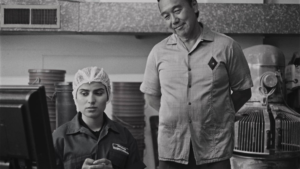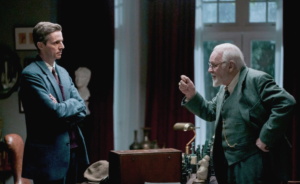Reviewed by GREG KING
Director: Neil Goss
Stars: Corynn Treadwell, Phil Blevins, Cha-tah Ellem, Kaleal Cerafici, Silvia Dionicio, Moses Meads, Xavier Michael, John Irving, Marie Smalley.

New York. A group of troubled teens, newly released from juvenile detention, band together to form a vigilante group determined to dispense justice in their neighbourhood.
There have been any number of films dealing with juvenile delinquents, ranging all the way back to the 50s with classics like Rebel Without A Cause and West Side Story through to Kubrick’sfuturistic A Clockwork Orange, Boyz N The Hood, Over The Edge, and Larry Clark’s controversial Kids. This low budget Australian produced feature looks at the theme of vigilantism through the perspective of a bunch of broken teens. Dipping its toes into the exploitation genre, Juvenile Delinquents has been described as something of a cross between Kids and vigilante drama Death Wish. If only it fully lived up to this description.
The story starts when the five males recently released from juvenile detention meet two drunk girls in the park. Sarah (Corynn Treadwell, in her film debut) convinces them to harass her foster father, who she claims has molested her. But things get out of hand and during a struggle the man is killed, and the group argue over who should take responsibility. The septet – Danny (Phil Blevins, from tv series Hunters, in his film debut), Sarah, the hot headed Nick (newcomer Cha-tah Ellem), Marko (newcomer Kaleal Cerafici), Lin (Silvia Dionicio), Ryker (Moses Meads) and the quiet and nerdy Chris (Xavier Michael) – decides to set themselves up to get a second chance by fighting back for those who can’t defend themselves.
Danny comes from a more entitled background, and takes charge of the group, and is largely responsible for them. He is living in the lavish apartment shared by his mother and her disapproving new husband, and his entitled background seems to set him apart from his friends who come from more unsettled backgrounds and have largely fallen through the cracks in society.
Their second target is Toby (John Irving) a man who has been accused of murdering his wife but has not been arrested. The girl’s anguished father wants them to find proof of his guilt. They kidnap Toby and torture him in the basement of Danny’s beachfront house to try and get him to confess. This brings some tension to the group, particularly as Nick and Danny clash.
Juvenile Delinquents is a film of big ambition and deals with some important themes like brotherhood, friendship, responsibility, second chances, peer pressure, redemption. This low budget Australian produced feature had plenty of promise and potential, but it is let down by the execution. This is the first feature for writer/director Neil Goss and his inexperience shows through at times. Goss wrote the book upon which the film is based, and he has managed to shape the sprawling source material into what we see on screen. The pacing is uneven and there are patches when the film drags. The running time of two hours is far too long, and Juvenile Delinquents could have benefitted from a punchier editing hand.
The climactic scenes set in the basement where they torture Toby to make him confess to his crime lacks the requisite gut punch it should have had. Goss pulls his punches here aiming for a low-key approach, but this mutes the impact of these scenes, which should have had a more gritty and brutal edge. Goss could have heightened the tension between the group and highlighted the moral quandary that they faced.
In keeping with the contemporary nature of the setting, Goss has deliberately cast a racially diverse cast of youngsters, many of whom have come from a background of television, to play these antiheroes. Their relative youth lends an authenticity to the material. This is the first film for Cerefini and Ellem and it shows in their occasionally tentative approach and stilted delivery of dialogue. Ellem is charismatic enough as the more volatile Nick, who often clashes with Danny. With lots more experience under his belt Blevins brings a certain confidence to his performance, while Treadwell brings a slightly manipulative touch to her performance. Chris doesn’t quite fit in with the group, and his character goes missing for much of the film.
But, basically, some of the characters are not fully drawn and it is hard to empathise with these disenfranchised kids looking for some form of redemption.
The film has been shot on location in New York by veteran and very busy cinematographer Dominick Siville (Couples Therapy, etc) and he gives the material a glossy surface look. The cinematography is a highlight of the film, and Sivilli does bring a hint of claustrophobic tension to the basement scene with his bleak colour palette and use of closeups.
★★☆



